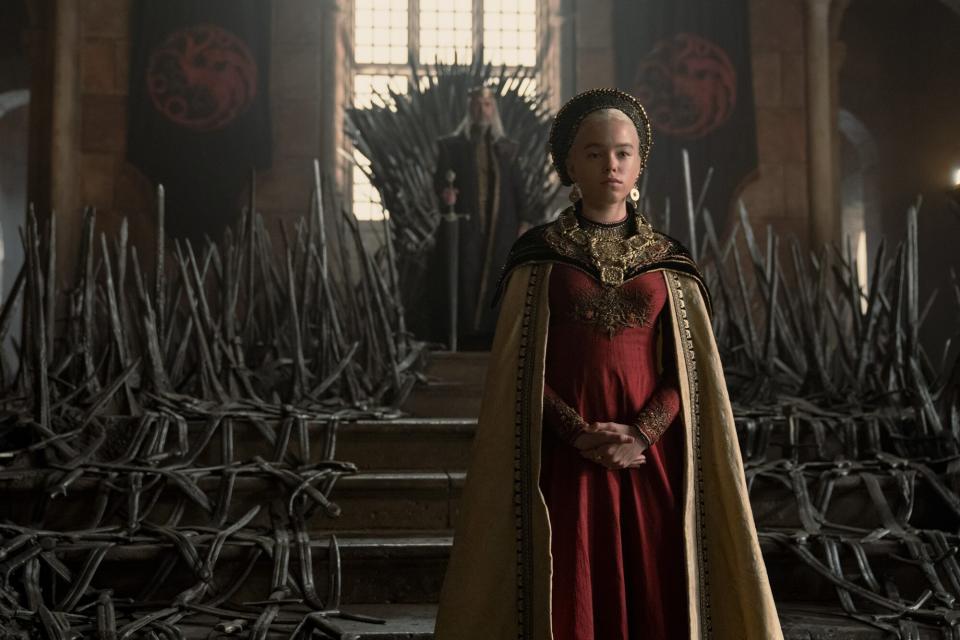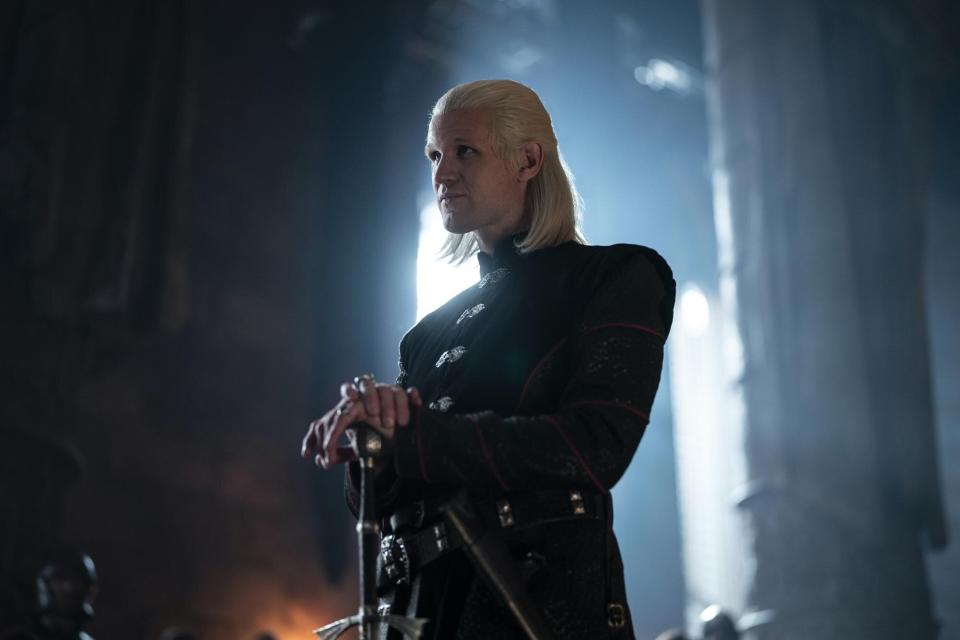House of the Dragon review: After a rough start, the Game of Thrones spin-off gets better
The good news with House of the Dragon is that the beginning is the worst part. Narration launches the Game of Thrones spin-off (debuting Sunday at 9 p.m. on HBO) with a quickie guide to the Targaryen dynasty. When a great council assembles to pick an heir to the Iron Throne, the narrator points out key figures. It's less dramatic than explanatory — the Harrenhal Evening News — and then on-screen text hiccups forward in time, landing us "172 years before Daenerys Targaryen."
This is the blandest possible orientation, Epic Fantasy for Dummies. Whatever Thrones was, it was never that. HBO's fantasy sensation kicked off in 2011 with extraordinary confidence in its massiveness and its mysteries, letting a snowy-enigmatic butchering lead gradually into the introduction of a dozen-plus connected characters. Dragon skips that slow burn, and accelerates its predecessor's late-era grandeur: Big sets, big fights, big tragedies, big dragons. After the prologue, one titular beast flies skyward above King's Landing. It's ridden by 15-year-old Princess Rhaenyra (Milly Alcock), wise beyond her overlooked years. Her father, King Viserys (Paddy Considine), has spent his only child's lifetime waiting for a male heir. The Seven Kingdoms are kingdoms; Viserys himself ascended after grandpa decided cousin Rhaenys (Eve Best) was too female to rule.

Ollie Upton/HBO Milly Alcock's Princess Rhaenyra Targaryen stands before the Iron Throne in 'House of the Dragon.'
Dragon foregrounds its fictional country's real gender divide. "The childbed is our battlefield," Queen Aemma (Sian Brooke) tells Rhaenyra. She knows from experience. Aemma's pregnant for the fifth time in a miscarriage-haunted decade. Her husband is certain this child will be his promised prince — and organizes a tournament to coincide with labor. (Great birth plan, pops.)
The easiest way to meet a big cast is to invite everyone to a party. As the tournament approaches, Viserys gets advice from a Small Council that includes Otto Hightower (Rhys Ifans) and Corlys Velaryon (Steve Toussaint). Otto's a born schemer. Corlys is a pirate-explorer-general-aristocrat, like if Blackbeard was also Francis Drake plus Lord Nelson times Odysseus. They have reasons to fret about Viserys' mad-eyed brother Daemon (Matt Smith), a walking personification of the TV-MA rating. Daemon lives out of a brothel and commands his City Watch to punish minor misdemeanors with major amputation. As Viserys' closest male relative, he's also the heir apparent.
That's a lot of people with platinum hair, though the names are easier to say than spell. I haven't even mentioned Otto's daughter Alicent (Emily Carey), Rhaenyra's pal and a key participant in the wars to come. Those two young women are the show's biggest gamble. Thrones let its young actors age into complex roles. Dragon moves more like another network predecessor, Rome, with years passing between some episodes. By the middle of this 10-part season, Rhaenyra and Alicent are adults (played by Emma D'Arcy and Olivia Cooke, respectively). Age carries the friendship into dangerous waters. Each time jump nudges Westeros toward calamity.
This rapid chronological pace honors franchise mastermind George R.R. Martin's vision. Dragon adapts his book Fire & Blood, a faux-history of the Targaryens. The author's mainline Song of Ice and Fire novels began in 1996 by decapitating all the familiar fantasy archetypes. For people like Ned Stark and Tyrion Lannister, the Targaryens were ancient history, representing a lost era of magic mayhem. It's possible that I gave Fire & Blood its loudest rave review, and I've always thought that the book was Martin writing fantasy with the safety off, unfurling a gory tapestry of dragon duels and larger-than-life icons.
Martin himself co-created Dragon with Ryan Condal, who showruns with Miguel Sapochnik. The latter directed four famous Thrones battles — and it's notable that none of those battles have appeared in Martin's novels yet. This tells you a lot about the difference between literary fantasy and TV fantasy, and Dragon's early episodes are promptly epic. Nearly every dialogue scene is about succession. An early tangent veers into naval warfare, with various forces fighting for crucial shipping lanes. The climactic skirmish is ridiculous on a strategic level — and gorgeous. At one point, in the ultra-distance — 50 miles away? — we see two battleships and a dragon dodge flaming catapults.
That scope is impressive, even when the details are shaky. Dragon centrally focuses on one location (the Red Keep) and one plotline (the King's heir), which makes it stagier than its far-flung predecessor. Characters constantly overhear the wrong thing around the corner. There is a horse-related fatality that is (accidentally) funny. And there is Mysaria (Sonoya Mizuno), Daemon's paramour, cursed with a comical accent that reminds you how shaky Thrones could be with non-Westerosi "foreignness."

Ollie Upton/HBO Matt Smith stars as Prince Daemon Targaryen in 'House of the Dragon.'
Two performances stand out, and a third turns extraordinary. Alcock is an outright discovery, playing a young royal with shades of over-it indifference and wounded ambition. She evokes a very Targaryen paradox, the sense that the incestuous family floats ethereally but also rains hell. Smith's Daemon is a veritable hell hurricane, bringing faint nobility to his wild-card impetuousness. By comparison, Considine seems cursed with no fun, as his King sinks under the crown's weight. The actor does so much with rueful silences, though, and lets you see how Viserys' frantic desperation to keep peace is also an eternal torment.
Is it a problem that only the Targaryens pop? After watching six episodes, I feel a lack of breakout supporting characters: No Sams, no Hounds, not even an Illyrio. Dragon has more of a clear mission than its bi-continental predecessor, and a much-stated central theme. "Were I born a man, I could bed whoever I wanted!" declares Rhaenyra, when a whole episode revolves around Red Keep goss about who's boning who. Rhaenyra and Alicent both get imprisoned by cultural expectation, pimped out by dads for high-status matches. We're a long way from adoring crowds cheering for Khaleesi. Instead, there's a constant argument that the country will rebel against any matriarch out of pure dick-ishness. (Since Dragon has a more diverse cast, this makes Westeros a paradoxical neverland that is openly sexist and completely un-racist.)
So the show wants the relationship between Rhaenyra and Alicent to take center stage. But the early episodes bungle their dynamic, with an unspecific friendship that's relegated to the sidelines. The drama heightens when clear battle lines get drawn. The first introduction of the grown-up characters is flat-out stunning, establishing palpable and sorrowful consequences for earlier decisions. And the sheer number of childbirth scenes would be a running gag if the show didn't render them, with vivid detail, as a genuine medical horror. Dragon doesn't soar immediately, but no House was built in a day. Grade: B
Related content:


